|
The OGS glider team was created in spring 2007, when a shallow water
SLOCUM glider (manufactured by Webb Research Corporation) was
purchased.
This glider was named TRIESTE-1 after the famous
bathyscaphe Trieste designed by August Piccard in the 1950's.
After having performed different missions in December 2009 the
communication with TRIESTE-1 was lost in the area South of Cyprus. It
was never recovered!
In 2010, the OGS glider group conducted another mission in the Ligurian Sea using a French glider thanks to the EGO collaboration. In spring 2012 a SeaGlider manufactured by the IRobot (named Amerigo) was acquired with the main purpose to use it in the area of the South Adriatic since it is designed for deep waters (up to 1000 m). This area, during winters, is a site of deep water convection which is monitored by OGS every year. In October 2013 two new SLOCUM gliders, Galileo and Leonardo, designed as shallow water instruments became part of the OGS fleet. They will be mainly operated in the north and central Adriatic Sea. A new Seaglider Kongsberg, named Marco, was purchased in September 2018 by the MAOS group and it will be used in the Mediterranean and in the Arctic sea. |
| 01 March - Ongoing | days | Convex 26_270 | Seaglider Venere configuration | Scientific - information | Technical - information |
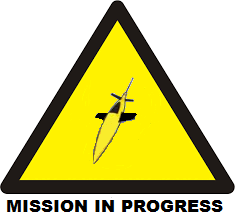
|
Convex 26_270 - 2026 MarchThe new Seaglider sg270 Venere was deployed for the first time in the Southern Adriatic Sea along the Bari – Dubrovnik transect. The purpose of the experiment was to monitor the convection condition in the area of the South-Adriatic pit |
| 01 March - Ongoing | days | Convex 26_269 | Seaglider Diana configuration | Scientific - information | Technical - information |

|
Convex 26_269 - 2026 MarchThe new Seaglider sg269 Diana was deployed for the first time in the Southern Adriatic Sea along the Bari – Dubrovnik transect. The purpose of the experiment was to monitor the convection condition in the area of the South-Adriatic pit |
| 05 February - 06 February 2026 | 1 days | Convex 26-2 | Seaglider Atena configuration | Scientific - information | Technical - information |

|
Convex 26-2 - 2026 FebruaryThe new Seaglider sg268 Atena was deployed for the first time in the Southern Adriatic Sea along the Bari – Dubrovnik transect. The purpose of the experiment was to monitor the convection condition in the area of the South-Adriatic pit |
| 30 August - 12 September 2025 | 12 days |
ITINERIS-SA |
Slocum 403 Leonardo configuration | Scientific - information | Technical - information |
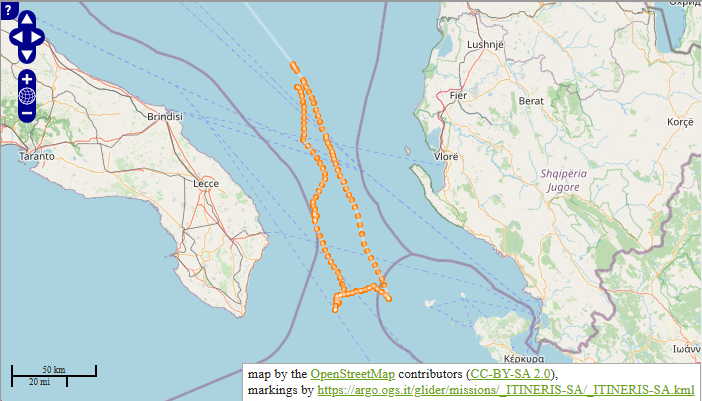
|
ITINERIS-SA - 2025 AugustThe Slocum glider unit403 Leonardo was operated in the Southern Adriatic Sea. The purpose of the experiment was to study the pre-convection in the area. The glider covered the transect Molfetta – Dubrovnik. It was piloted to perform an Adriatic longitudinal transect in the area of the south-Adriatic pit. |
| 12 February - 21 February 2025 | 9 days | GLOB | Seaglider Marco configuration | Scientific - information | Technical - information |
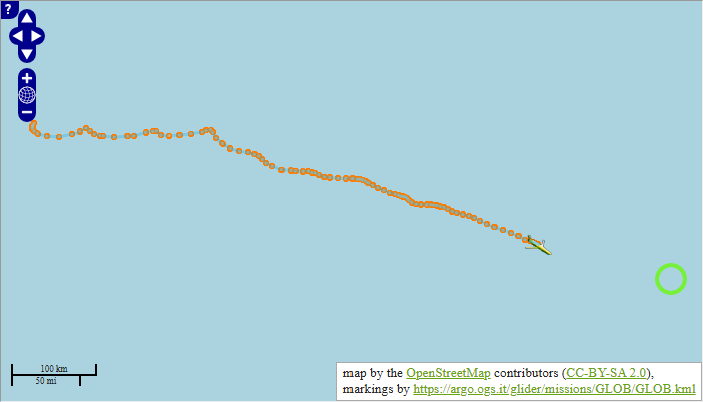
|
GLOB - 2025 FebruaryThe Seaglider sg661 Marco was deployed in the Antarctic area as part of the Signature project to study water masses and dynamics in the East Ross Sea. |
| 11 January - 08 February 2025 | 27 days | Convex 25 | Seaglider Amerigo configuration | Scientific - information | Technical - information |

|
Convex 25 - 2025 JanuaryThe Seaglider sg554 Amerigo is deployed in the Southern Adriatic Sea along the Molfetta – Dubrovnik transect. The purpose of the experiment was to monitor the convection condition in the area of the South-Adriatic pit. |
| 28 April - 05 May 2024 | 6 days | BIOTREC | Slocum 403 Leonardo configuration | Scientific - information | Technical - information |

|
BIOTREC - 2024 AprilThe Slocum 403 Leonardo was deployed outside of the Gulf of Naples. The purpose of the experiment was to monitor the biological conditions. |
| 27 January - 09 February 2024 | 13 days | SIGNATURE 24 | Seaglider Marco configuration | Scientific - information | Technical - information |
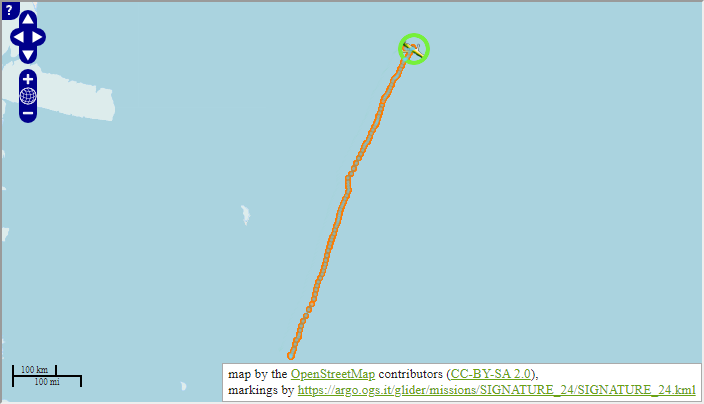
|
SIGNATURE 24 - 2024 JanuaryThe Seaglider sg661 Marco was deployed in the Antarctic area as part of the Signature project to study water masses and dynamics in the East Ross Sea. |
| 16 January - 06 March 2024 | 49 days | Convex 24 | Seaglider Amerigo configuration | Scientific - information | Technical - information |
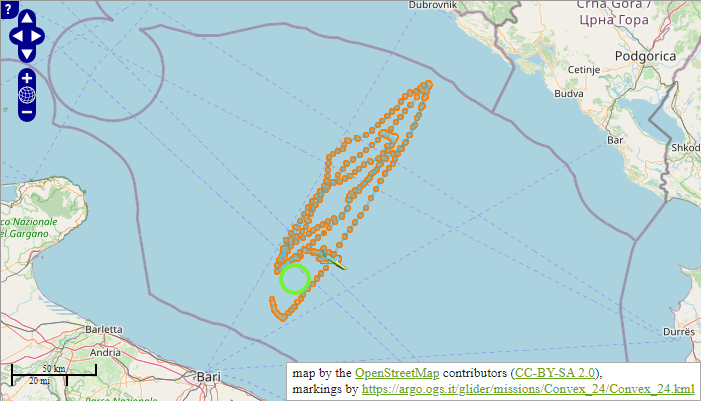
|
Convex 24 - 2024 JanuaryThe Seaglider sg554 Amerigo is deployed in the Southern Adriatic Sea along the Molfetta – Dubrovnik transect. The purpose of the experiment was to monitor the convection condition in the area of the South-Adriatic pit. |
| 27 November - 05 December 2023 | 7 days | PreConvex 24 | Seaglider Amerigo configuration | Scientific - information | Technical - information |
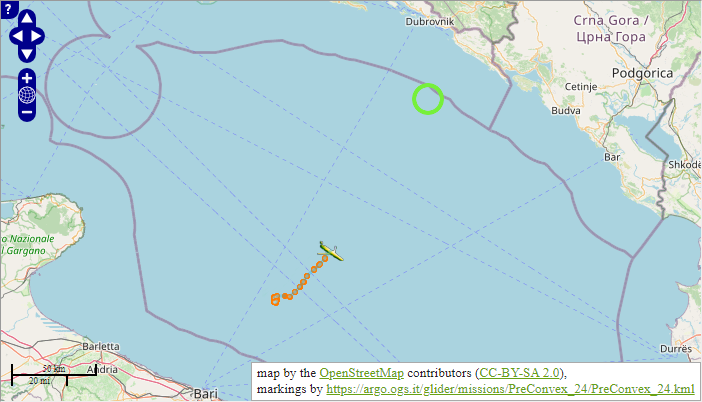
|
PreConvex 24 - 2023 NovemberThe Seaglider sg554 Amerigo is deployed in the Southern Adriatic Sea along the Molfetta – Dubrovnik transect. The purpose of the experiment was to monitor the convection condition in the area of the South-Adriatic pit. |
| 14 January - 01 February 2023 | 17 days | Convex 23 | Seaglider Amerigo configuration | Scientific - information | Technical - information |
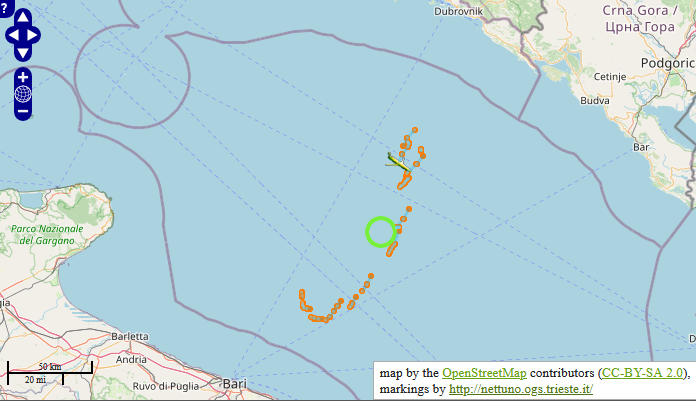
|
Convex 23 - 2023 JanuaryThe Seaglider sg554 Amerigo is deployed in the Southern Adriatic Sea along the Molfetta – Dubrovnik transect. The purpose of the experiment was to monitor the convection condition in the area of the South-Adriatic pit. |
| 28 January - 25 February 2022 | 27 days | Convex 22 | Seaglider Amerigo configuration | Scientific - information | Technical - information |
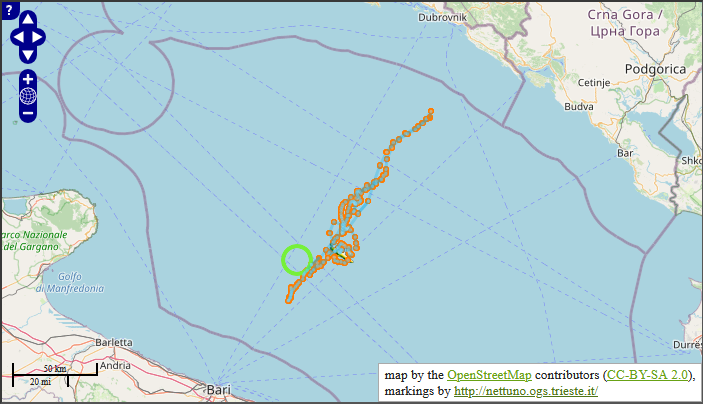
|
Convex 22 - 2022 JanuaryThe Seaglider sg554 Amerigo is deployed in the Southern Adriatic Sea along the Molfetta – Dubrovnik transect. The purpose of the experiment was to monitor the convection condition in the area of the South-Adriatic pit. |
| 28 January - 05 March 2021 | 35 days | Convex 21 | Seaglider Amerigo configuration | Scientific - information | Technical - information |
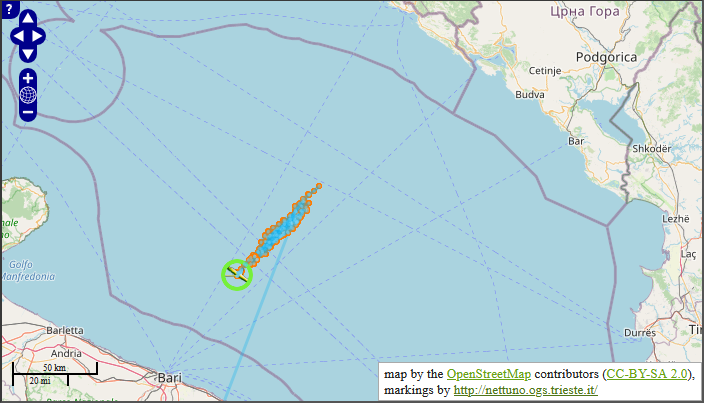
|
Convex 21 - 2021 JanuaryThe Seaglider sg554 Amerigo is deployed in the Southern Adriatic Sea along the Molfetta – Dubrovnik transect. The purpose of the experiment was to monitor the convection condition in the area of the South-Adriatic pit. |
| 12 June - 02 July 2020 | 20 days | Convex 20 | Seaglider Amerigo configuration | Scientific - information | Technical - information |
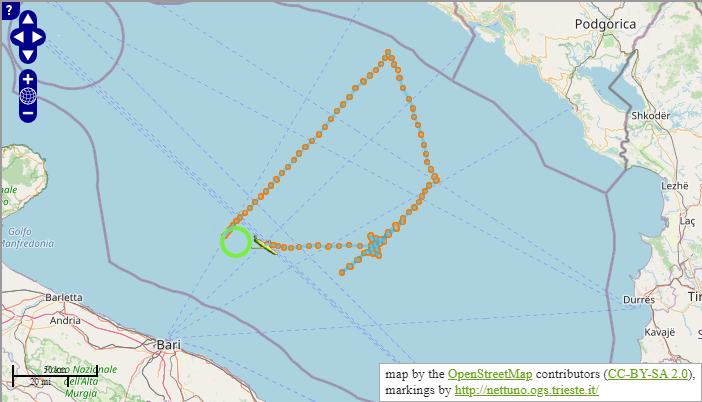
|
Convex 20 - 2020 JuneAs part of South Adriatic monitoring annual program, a glider was deployed in the Southern Adriatic Sea from June 12 to July 2, 2020. The mission had the aim to assess the hydrographical characteristics present in June in the area of the South Adriatic pit after the winter deep convection. This glider mission is part of the 2019-2020 Saildrone Atlantic to Mediterranean (ATL2MED) mission, in which two autonomous wind-powered vehicles sailed from Cabo Verde to Trieste, Italy, demonstrating how fit-for-purpose technology can be used to increase ocean observation. During the mission Autonomous Surface and Subsurface Vehicles Work Together to Observe CO2 Exchange in the Adriatic Sea. The saildrones will attempt to join a OGS-led glider study in the Southern Adriatic close to the E2M3A station, providing surface observations to complement the sub-surface glider observations. |
| 18 January - 26 January 2020 | 7 days | ESTRO 20 | Seaglider Marco configuration | Scientific - information | Technical - information |
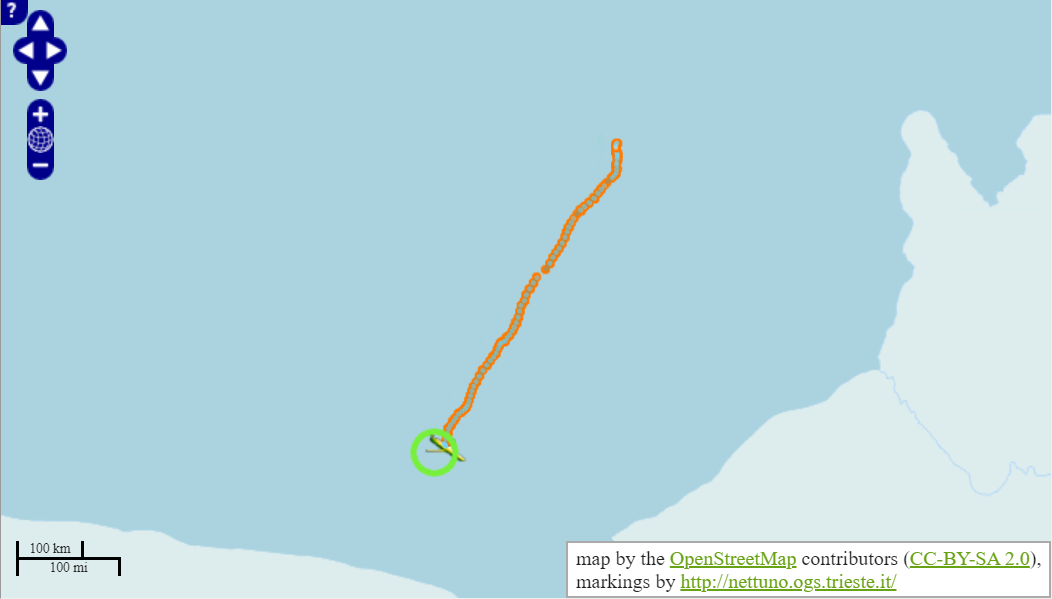
|
ESTRO 20 - 2020 JanuaryThe Seaglider sg661 Marco was deployed in the Antarctic area as part of the Estro project to study water masses and dynamics in the East Ross Sea (for additional info https://www.inogs.it/it/content/23-gennaio-il-glider-di-ogs-missione-antartide |
| 21 November - 01 December 2019 | 9 days | PreConvex 20 | Seaglider Amerigo configuration | Scientific - information | Technical - information |
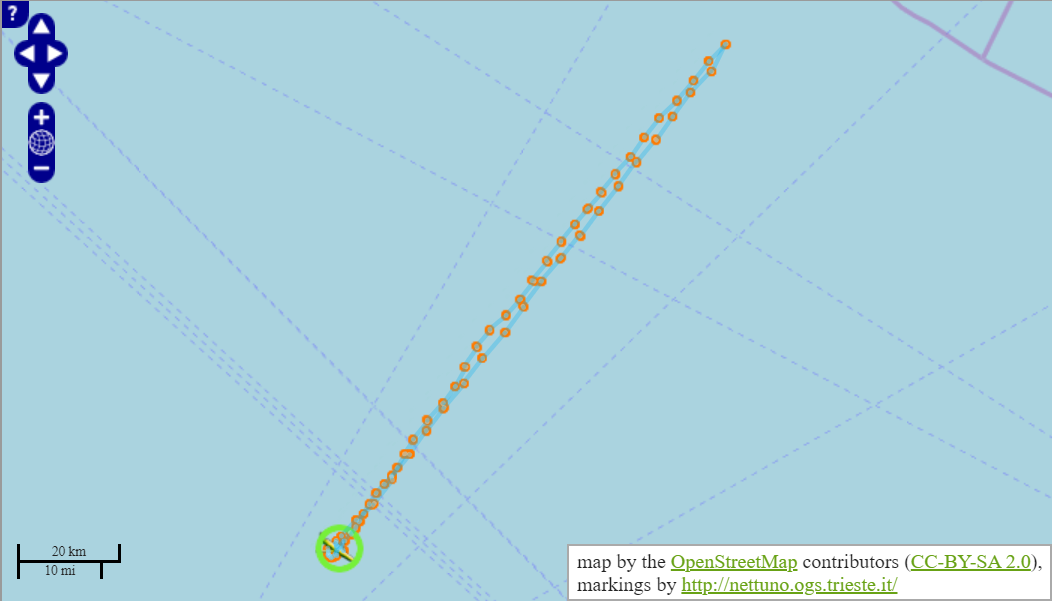
|
PreConvex 20 - 2019 NovemberThe Seaglider sg554 Amerigo is deployed in the Southern Adriatic Sea along the Molfetta – Dubrovnik transect. The purpose of the experiment was to monitor the convection condition in the area of the South-Adriatic pit. |
| 12 February - 18 April 2019 | 64 days | Melmas 19 | Seaglider Marco configuration | Scientific - information | Technical - information |
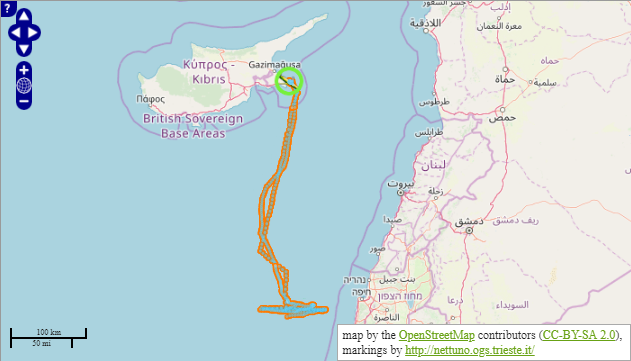
|
Melmas 19 - 2019 FebruaryThe Seaglider sg554 Amerigo was involved in the second part of MELMAS experiment (Monitoring of the Eastern Levantine with Mobile Autonomous Systems) in the East Mediterranean Sea, to monitor the area in front of Israeli coast. The project focused on the interaction between the open and coastal water masses and to study mesoscale feature present in the area and detached from the coastal current in The winter period. |
| 29 January - 09 February 2019 | 10 days | Convex 19 | Slocum 403 Leonardo configuration | Scientific - information | Technical - information |
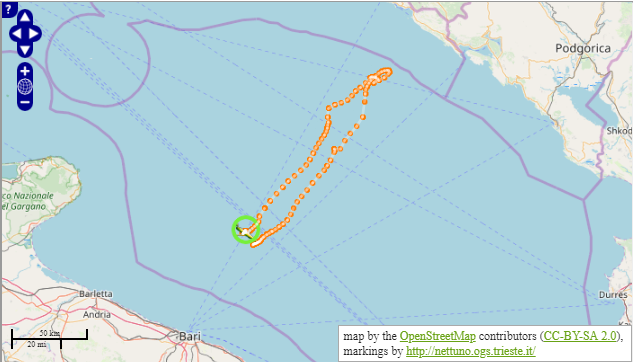
|
Convex 19 - 2019 JanuaryThe Slocum 403 Leonardo was deployed in the Southern Adriatic Sea along the Molfetta – Dubrovnik transect. The purpose of the experiment was to monitor the convection mechanism in the area. |
| 22 November - 04 December 2018 | 11 days | PreConvex 19 | Seaglider Marco configuration | Scientific - information | Technical - information |
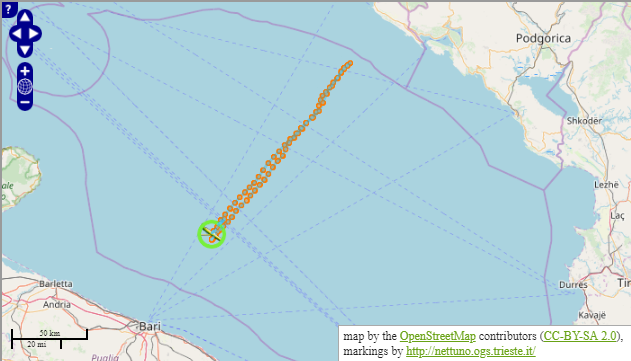
|
PreConvex 19 - 2018 NovemberThe Seaglider sg661 Marco will be deployed in the Southern Adriatic Sea along the Molfetta – Dubrovnik transect. The purpose of the experiment was to monitor the pre-convection condition in the area. |
| 24 May - 23 July 2018 | 60 days | Melmas 18-2 | Seaglider Amerigo configuration | Scientific - information | Technical - information |
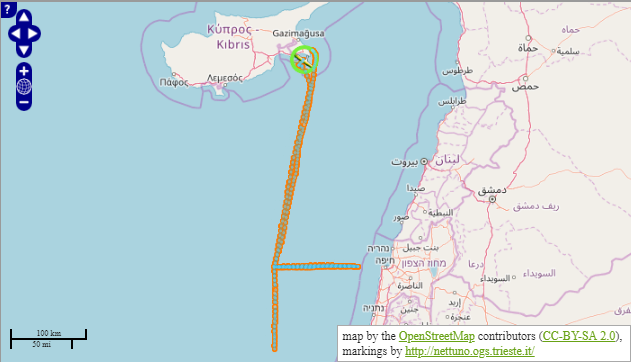
|
Melmas 18-2 - 2018 MayThe Seaglider sg554 Amerigo was involved in the second part of MELMAS experiment (Monitoring of the Eastern Levantine with Mobile Autonomous Systems) in the East Mediterranean Sea, to monitor the area in front of Israeli coast. The project focused on the interaction between the open and coastal water masses and to study mesoscale feature present in the area and detached from the coastal current in the spring period. |
| 29 January - 17 February 2018 | 18 days |
Convex 18 |
Slocum 403 Leonardo configuration | Scientific - information | Technical - information |
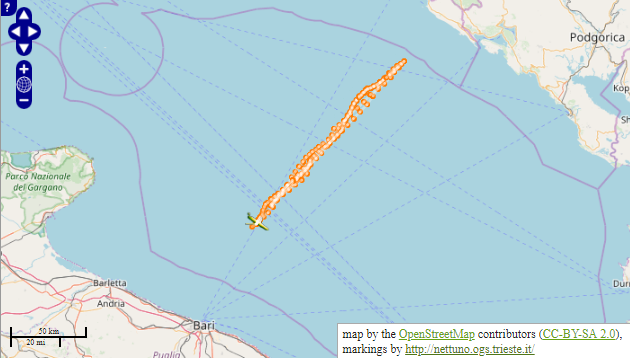
|
Convex 18 - 2018 JanuaryThe Slocum 403 Leonardo was deployed in the Southern Adriatic Sea along the Molfetta – Dubrovnik transect. The purpose of the experiment was to monitor the convection mechanism in the area. |
| 02 December - 14 December 2017 | 11 days | PreConvex 18 | Slocum 402 Galileo configuration | Scientific - information | Technical - information |
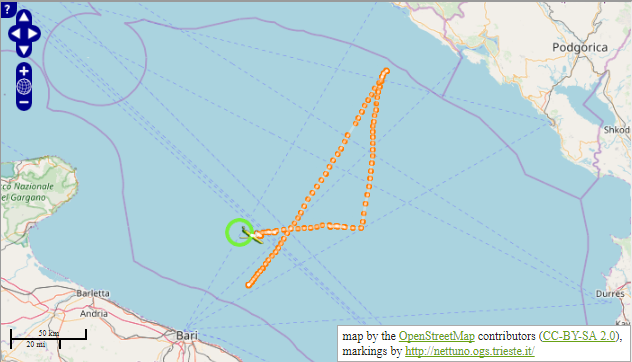
|
PreConvex 18 - 2017 DecemberThe Slocum 402 Galileo was deployed in the Southern Adriatic Sea along the Molfetta – Dubrovnik transect. The purpose of the experiment was to monitor the pre-convection condition in the area. |
| 06 May - 10 May 2017 | 4 days |
Convex 17 |
Slocum 403 Leonardo configuration | Scientific - information | Technical - information |
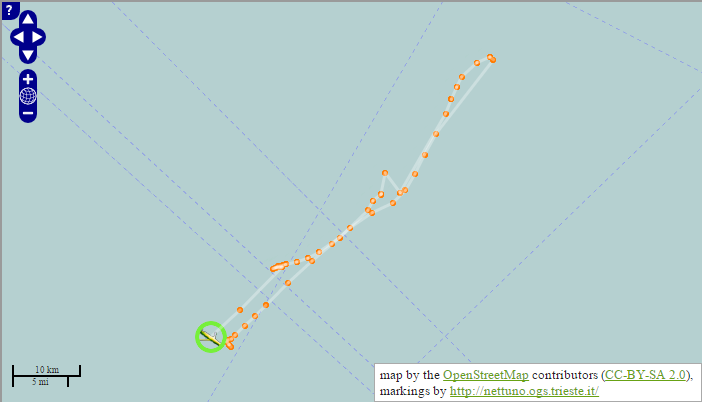
|
Convex 17 - 2017 MayThe Slocum 403 Leonardo was deployed in the Southern Adriatic Sea along the Molfetta – Dubrovnik transect. The purpose of the experiment was to monitor the post-convection condition in the area. |
| 10 February - 16 March 2017 | 33 days | Cinel 17 | Seaglider Amerigo configuration | Scientific - information | Technical - information |
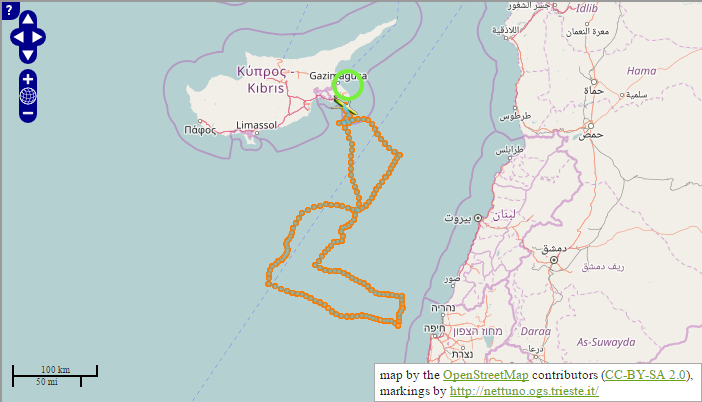
|
Cinel 17 - 2017 FebruaryThe Seaglider sg554 Amerigo was involved in the CINEL (Circulation and water mass properties In the North-Eastern Levantine) experiment in the East Mediterranean. (For additional info http://nettuno.ogs.trieste.it/sire/cinel/info.html) |
| 03 December - 12 December 2016 | 9 days |
PreConvex 17 |
Slocum 403 Leonardo configuration | Scientific - information | Technical - information |
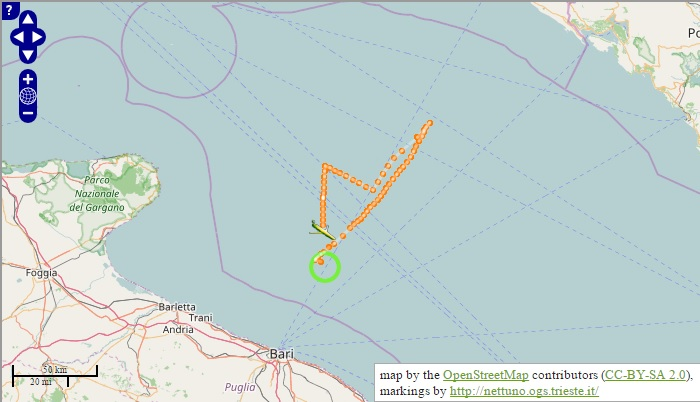
|
PreConvex 17 - 2016 DecemberThe Slocum glider unit403 Leonardo was operated in the Southern Adriatic Sea along the Molfetta - Dubrovnik transect. The purpose of the experiment was to monitor the pre-convection condition in the area. |
| 19 October - 07 December 2016 | 48 days | Cinel 16 | Seaglider Amerigo configuration | Scientific - information | Technical - information |
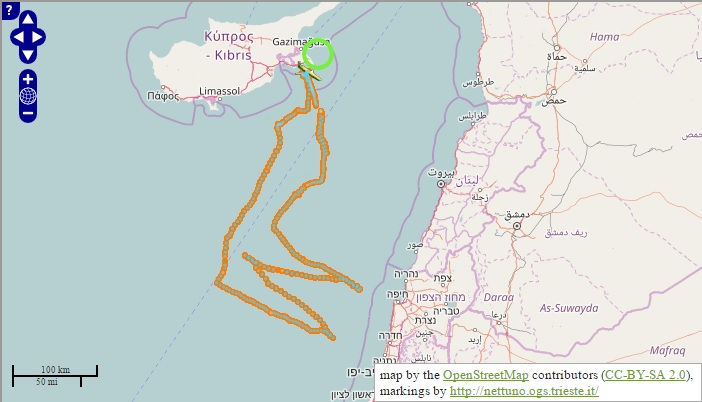
|
Cinel 16 - 2016 OctoberThe Seaglider Amerigo was involved in the CINEL (Circulation and water mass properties In the North-Eastern Levantine) experiment in the East Mediterranean. The glider was recovered South of Cyprus after a 48-day mission. For additional info (http://nettuno.ogs.trieste.it/sire/cinel/info.html) |
| 22 April - 01 May 2016 | 8 days |
Convex 16 |
Slocum 403 Leonardo configuration | Scientific - information | Technical - information |
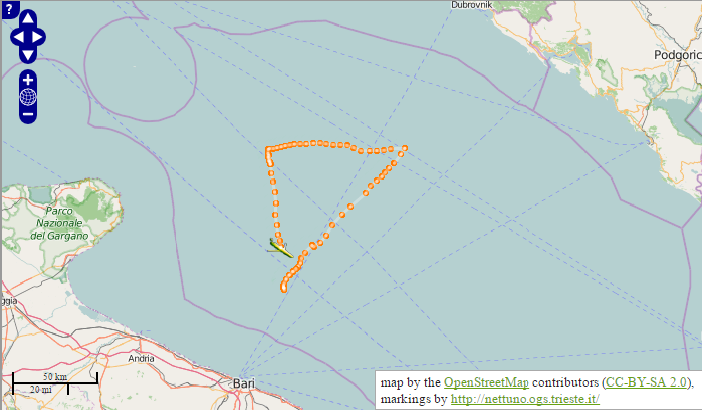
|
Convex 16 - 2016 AprilThe Slocum 403 Leonardo was deployed in the Southern Adriatic Sea. The purpose of the experiment was to study the post convection and the effect of the deep water formation in the North Adriatic Sea. The glider covered part of the transect Molfetta – Dubrovnik and an area close of the Italian slope to inquire about the dense water cascading. It was piloted down to almost 1000m deep in the area of the south-Adriatic pit. |
| 20 November - 01 December 2015 | 11 days |
PreConvex 16 |
Slocum 403 Leonardo configuration | Scientific - information | Technical - information |
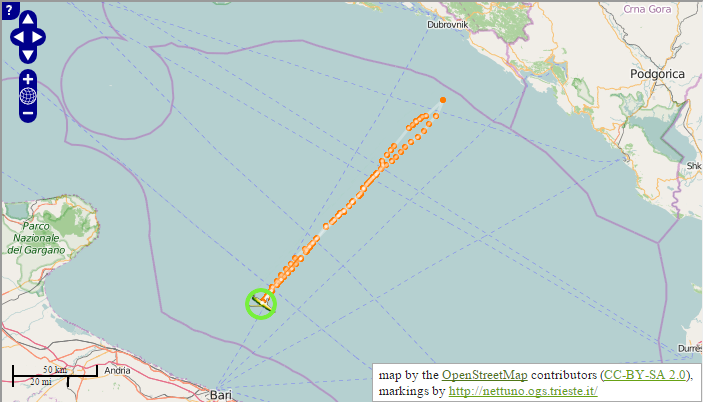
|
PreConvex 16 - 2015 NovemberThe Slocum glider unit403 Leonardo was operated in the Southern Adriatic Sea. The purpose of the experiment was to study the pre-convection in the area. The glider covered the transect Molfetta – Dubrovnik. It was piloted to perform an Adriatic longitudinal transect in the area of the south-Adriatic pit. |
| 24 February - 27 February 2015 | 2 days | Quarnero 2015 | Slocum 403 Leonardo configuration | Scientific - information | Technical - information |
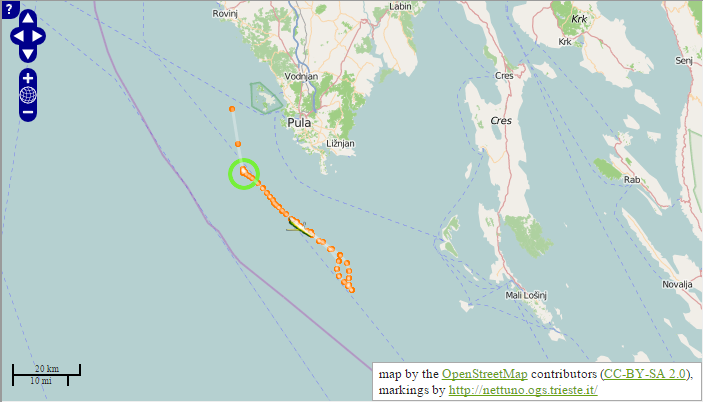
|
Quarnero 2015 - 2015 FebruaryThe Slocum shallow glider unit403 Leonardo was operated in a mission within the North Adriatic Experiment 2015 in the Kvarner area. About 700 yos between 20 and 45 meters were performed collecting high frequency data of pressure, temperature, conductivity, oxygen, chlorophyll, CDOM and backscatter. |
| 15 February - 06 March 2014 | 18 days |
Convex 14 |
Seaglider Amerigo configuration | Scientific - information | Technical - information |
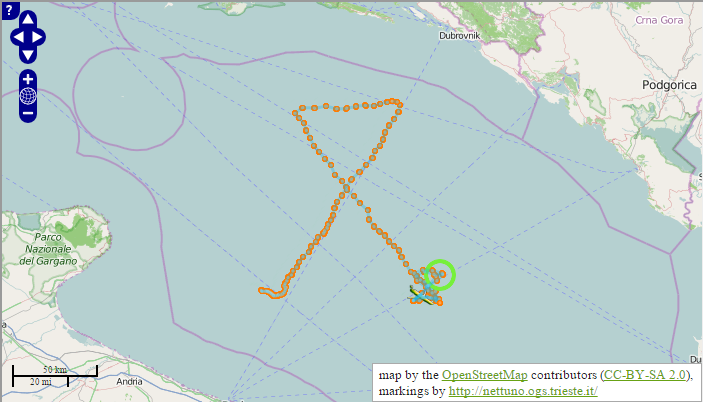
|
Convex 14 - 2014 FebruaryThe Seaglider Amerigo was operated for 3 weeks in the Southern Adriatic Sea. The purpose of the experiment was to study the winter deep water convection in the area. The glider at first covered the transect Molfetta – Dubrovnik and then it was piloted to perform an Adriatic longitudinal transect, down to almost 1000m deep in the area of the South-Adriatic pit. At the end of the mission a butterfly sampling was performed close to the E2-M3A mooring. |
| 15 May - 21 May 2013 | 5 days | Coconet | Seaglider Amerigo configuration | Scientific - information | Technical - information |
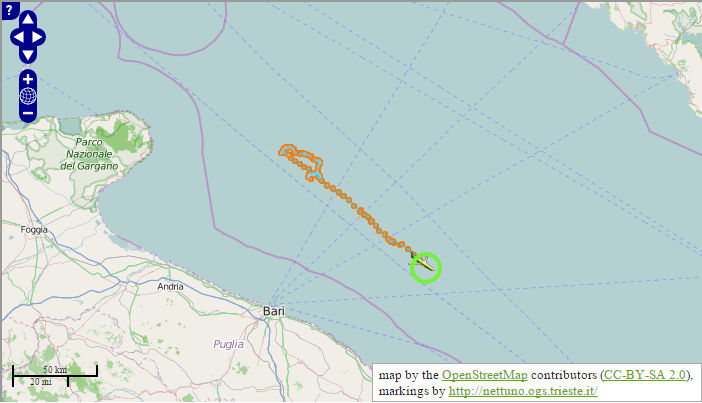
|
Coconet - 2013 MayThe Seaglider Amerigo was deployed on May 15 and recovered on May 21, 2013. The area sampled during the mission covered the South Adriatic pit and the slope close to the Italian coast. In this experiment the OGS pilot team had the opportunity to trim the newly acquired glider fine-tuning the navigation parameters. |
| 12 March - 13 March 2013 | 0 days | Convex 13 | Seaglider Amerigo configuration | Scientific - information | Technical - information |
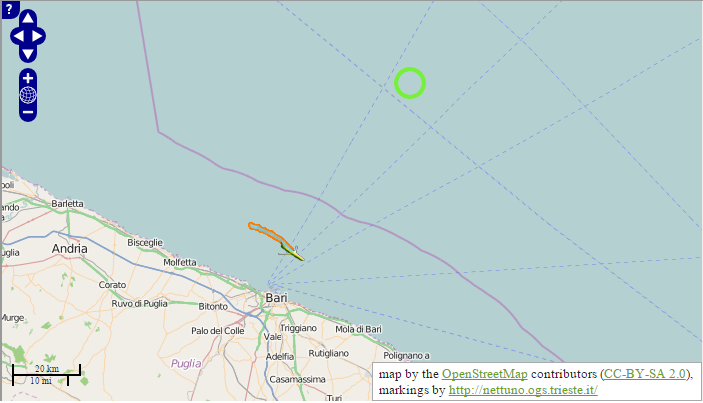
|
Convex 13 - 2013 MarchThe Seaglider Amerigo was deployed in the Southern Adriatic Sea after the Teledyne tests. The mission last less then a day due to the WetLab fluorimeter connector leakage and some glider trim issues. |
| 03 July - 20 July 2010 | 16 days |
LIDEX 10 |
Slocum Tenuse configuration | Scientific - information | Technical - information |
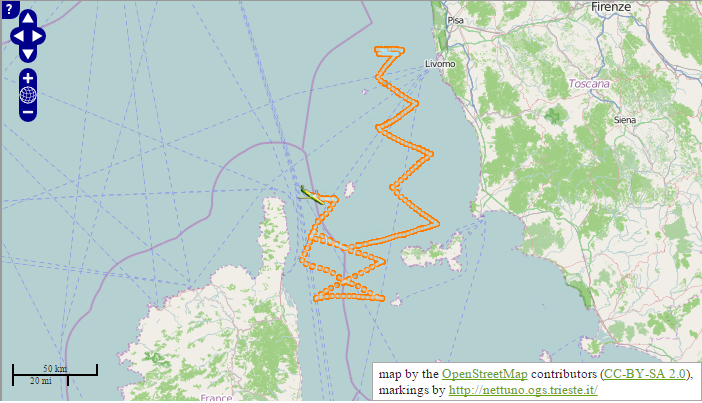
|
LIDEX 10 - 2010 JulyThe French Slocum glider Tenuse, was operated to explore and study the dynamics of the southeastern Ligurian and Corsica Channel in summer 2010 as part of the LIDEX10 experiment, whose general objective was to improve the understanding of turbulent transport and dispersion in the ocean, more specifically to study the dispersion in a coastal frontal zone due to mixing by meso- and submesoscale structures |
| 24 November - 21 December 2009 | 26 days | EYE - Cyprus 09 | Slocum Trieste 1 configuration | Scientific - information | Technical - information |
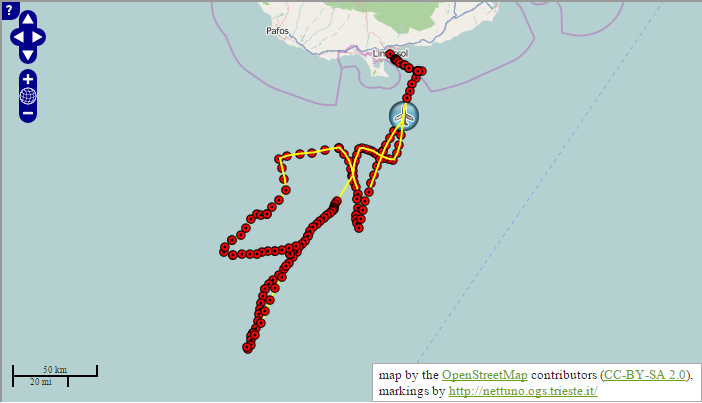
|
EYE - Cyprus 09 - 2009 NovemberThe slocum glider ‘Trieste 1’ was implied as part of an international project in the Levantine basin focused on a permanent cyclonic gyre south of Cyprus. The aim of the experiment was to produce an accurate 3-dimensional survey of this structure is supposed to create a physical barrier, which disconnects the “inside gyre” ecosystem dynamic to the “outside gyre” one. The mission last almost a month and was performed together with other 4 gliders: 3 deep gliders (sampling to 1000m) and an other shallow (sampling to 200m).gyre” one. The mission last almost a month and was performed together with other 4 gliders: 3 deep gliders (sampling to 1000m) and an other shallow (sampling to 200m). |
| 23 May - 30 May 2009 | 6 days | Tyrrmount 09 | Slocum Trieste 1 configuration | Scientific - information | Technical - information |
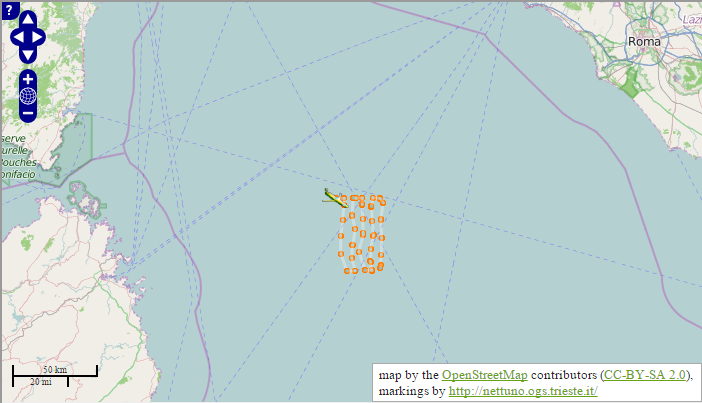
|
Tyrrmount 09 - 2009 MayThe slocum glider 'Trieste 1' was operated around the Vercelli seamount in the Tyrrhenian basin (Western Mediterranean Sea). The aim of the experiment was to study the effect on the hydrodynamics of the Vercelli seamount rising from the ocean seafloor (more then 1000 m) to 55 m below the surface. |
| 21 October - 22 October 2008 | 0 days | MREA 08 part 2 | Slocum Trieste 1 configuration | Scientific - information | Technical - information |
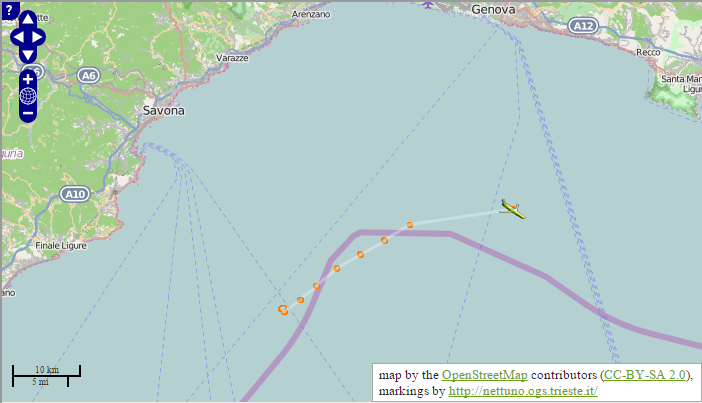
|
MREA 08 part 2 - 2008 OctoberThe slocum glider ‘Trieste 1’ was deployed in the Ligurian Sea during the MREA08 Experiment. The main goal of the experiment was to collect oceanographic data to calibrate and validate the MREA (Marine Environmental Rapid Assessment) model system for environmental applications (i.e.: contaminant dispersal) in open sea and coastal areas. The glider experienced some technical problems (rudder damage, leakage) and performed only a limited number of profiles. |
| 20 October - 20 October 2008 | 0 days | MREA 08 part 1 | Slocum Trieste 1 configuration | Scientific - information | Technical - information |
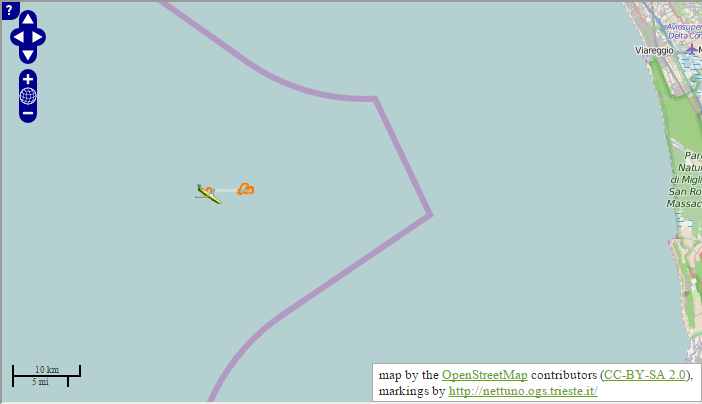
|
MREA 08 part 1 - 2008 OctoberThe slocum glider ‘Trieste 1’ was deployed in the Ligurian Sea during the MREA08 Experiment. The main goal of the experiment was to collect oceanographic data to calibrate and validate the MREA (Marine Environmental Rapid Assessment) model system for environmental applications (i.e.: contaminant dispersal) in open sea and coastal areas. The glider experienced some technical problems (rudder damage, leakage) and performed only a limited number of profiles. |
| 20 June - 21 June 2007 | 0 days | MREA 07 | Slocum Trieste 1 configuration | Scientific - information | Technical - information |
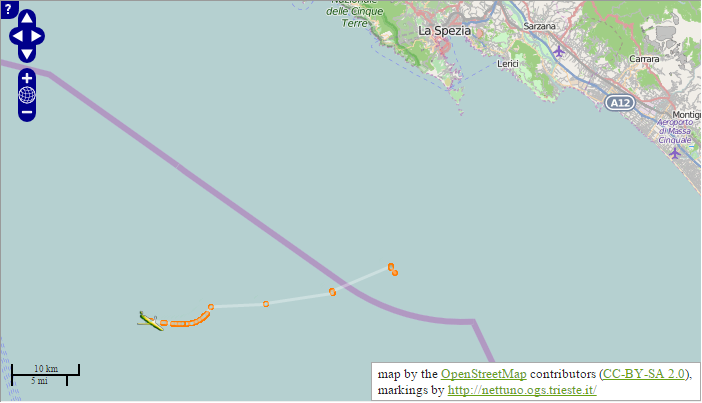
|
MREA 07 - 2007 JuneThe MREA07 mission initially involves sampling along the transect between (25 nautical miles) the buoy SAMA-MAMBO (44°02’N - 9°50’E) and the buoy ODAS (43°47,36’N - 9°9,80’E) (25 nautical miles). The experiment lasted 3 days and, the glider had to remain underwater for 5 hours. |
